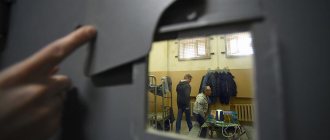The structure of correctional institutions is complex and contains concepts and terms that may not be clear to the average person. In this article we will talk about a term that can often be found in news reports, television programs and films, this is a punishment cell.
It is worth remembering that a punishment cell is not the same as a punishment cell. We are used to hearing about punishment cells from foreign films, but they also exist in Russia. Let's start with the definition of a punishment cell.
What is a punishment cell and its difference from a punishment cell
Punishment cells, or abbreviated punishment cells, are the departments in correctional institutions where cells are located for violators of the prison regime.
Punishment cells exist only in correctional colonies - in pre-trial detention centers or prisons, their analogues are punishment cells. The main differences between them are the terms of imprisonment and the nature of the detention (in punishment cells, prisoners are kept alone, they stay for a longer period - up to six months).
You will find more information about what a punishment cell is and what the conditions of detention in it are in a separate material.
For minors
DIZO is a disciplinary isolation ward, a type of punishment cell, typical for educational colonies. Unlike correctional institutions, juvenile citizens serve their sentences in educational institutions.
According to Article 137 of the Penal Code of the Russian Federation, the conditions there are very similar to a punishment cell, but somewhat softened.
Article 137 of the Penal Code of the Russian Federation. The procedure for applying penalties to those sentenced to imprisonment in educational colonies
- Convicts placed in a disciplinary detention center are prohibited from long visits, telephone conversations, purchasing food and basic necessities, receiving parcels, packages and parcels, using board games and smoking. They have the right to enjoy a daily walk of two hours.
- All penalties may be applied to convicts placed in a disciplinary isolator, except for placement in a disciplinary isolator.
- For educational purposes or for medical reasons, the early release of a convicted person from a disciplinary detention center is permitted by order of the head of the educational colony or his deputy.
With the permission of the head of the correctional institution, short-term visits are allowed to a juvenile offender - but no more; parcels, parcels and telephone conversations are also prohibited.
The daily walk of prisoners in the pre-trial detention center is two hours. To continue their education, minors are allowed to have the necessary textbooks and notebooks in the detention center. But board games and cigarettes are not allowed in the DIZO.
In contrast to the maximum fifteen days in a punishment cell, you can only put the offender in a pre-trial detention center for ten days. But remember how harsh the prison authorities can be - after “resting” in a regular cell for a couple of days, the prisoner can again be sent to the isolation ward.
You can learn more about the nuances of keeping minors in educational colonies in a separate article.
Conditions of detention in punishment cells
The conditions in punishment cells are frankly depressing: the area of the cells usually does not reach ten square meters, despite the fact that according to SanPiN it is recommended to allocate 4 meters for one prisoner. The technical plan of the room provides for a small window, but it is often covered with either several sheets of iron or bars.
The insulator is framed by concrete walls, on which soot accumulates and paints them black, a ceiling and a cemented floor. On the sides of the insulator there are folding bunks fastened to the walls. A table or chairs mounted into the floor can be located in the center of the isolator. Water pipes run along the walls.
Bunks are structures in the form of several sheets of wood or iron fastened together. In a punishment cell, the number of sleeping places does not always correspond to the number of prisoners held there , so sleep is subject to a schedule - while some are sleeping, others are crowded into the corners. Each prisoner is given an individual set of linen and a mattress, but this is not always observed, and the quality of the material leaves much to be desired.
Attention! The possibility and duration of daytime sleep directly depends on the severity of the duty shift of prison workers, as well as on the peculiarities of the prison schedule - inspection of cells during shifts of duty officers, searches, inspection of the premises by the warden and his deputies, and a medical worker - all this can interrupt rest.
Lighting is provided by an accumulation lamp hanging in the center of the room. There is a sink in the corner. Facilities are usually represented by either a toilet or a portable bucket located in the corner.
In the cells of punishment cells, convicts continue to perform daily duties, for which they perform alternate duties. Duty includes monitoring the safety of cell equipment, equipment, obtaining dishes and cleaning equipment for prisoners. The duty officer is personally responsible for these items.
His responsibilities also include monitoring the cleanliness of the cell; cleaning the cell bathroom and drinking water tank, and at the end of the prescribed walk - the prison yard. The duty officer in the punishment cell may be assigned other duties by the administration of the correctional institution , if they do not contradict aspects of the legal framework for keeping prisoners in custody.
In addition to being on duty, prisoners for whom a penalty in the form of placement in a punishment cell is imposed with a transfer to work are engaged in labor activities during the day. The right to receive medical care is reserved for prisoners and is carried out in the form of preventive medical examinations and outpatient treatment, carried out in specially equipped rooms located in the buildings of the correctional institution.
The sanitary situation is catastrophic and is due to the inadequacy of the conditions for the number of prisoners, high humidity, and an abundance of cockroaches, bedbugs and fleas. According to the regime, prisoners eat three times a day, and they are also entitled to daily walks lasting an hour and a half (you can find out what prisoners are fed in correctional institutions here).
It is worth noting that for convicts who do not violate the established order while in a punishment cell, the walking time can be increased to three hours a day on the instructions of the head of the correctional institution.
Such restrictions, even in the already difficult conditions of prison, create an unfavorable atmosphere for the mental state of the prisoner and thereby complicate the process of serving the sentence.
During the Soviet period, the punishment cell was characterized by more difficult living conditions. Until 1988, a reduced food standard for prisoners was legally approved. Feeding was carried out every other day. Walking was prohibited, mattresses and bed linen were not provided.
Reference. Violators of the prison regime were confiscated from their everyday clothes and given a cotton suit with poor hygienic and heat-protective properties. This was the case until 1992, when appropriate changes were made to the legislation regarding the nature of the conditions of stay of prisoners in the punishment cell.
We tell you more about the stay of prisoners in punishment cells, pre-trial detention centers and other places for punishment in a separate material.
For what offenses is a punishment cell assigned?
Staying in a punishment cell is one of the types of disciplinary sanctions for violating the established order in penal institutions. It is worth noting that the punishment cell is used in cases of repeated violations of the prison regime and is assigned exclusively with the consent of the administration.
The main reasons for ending up in a punishment cell include:
- Systematic violations of order: fights, scandals, incitement of hatred, conflicts with prison staff.
- Storage of items prohibited or not provided for by the penal code of the Russian Federation: narcotic substances, various types of weapons, chemicals with toxic properties.
Control over the creation, operation and liquidation of cell-type premises is carried out by the federal executive body that implements state policy and legal regulation in the field of execution of criminal penalties.
The purpose of staying in a punishment cell as a punishment for various offenses and violations of the regime is regulated at the legislative level - in Article No. 118 of the Criminal Executive Code of the Russian Federation. Features of the detention of convicts are described in Order of the Ministry of Justice of Russia dated March 27, 2019 N 51 “On Amendments to the Internal Regulations of Correctional Institutions.”
On our website you can learn about the conditions of detention of prisoners in correctional institutions with various regimes. In special publications we tell:
- Where and how do teenagers serve their sentences?
- What are the features of women's prisons in Russia?
- What are the conditions of detention in general, strict and special regime?
Length of stay
The documents mentioned above indicate the limit of stay of the violating prisoner in the punishment cell - according to the law, this time should not exceed fifteen days. However, in cases of continued violations of order and no signs of improvement in the behavior of the prisoner, this period may be increased. There is an unspoken scheme:
- A prisoner who violates internal regulations is placed in a punishment cell for 15 days at the request of the prison administration.
- Upon expiration of the period of stay, the convict is transferred to a general cell.
- After a short period of time, charges are brought against him or he is provoked to commit illegal actions, after which the administration puts forward a new demand for the convict to be returned to the punishment cell.
Important! If the repeated placement of the offender in a punishment cell does not lead to results, a more severe type of punishment is provided - transfer to solitary confinement or punishment cells, where the time of stay can be increased significantly.
Deadlines and other features
Due to the extreme complexity and severity of the proposed conditions, the legislator provides a limit on the maximum period of one-time use of a punishment cell, which is limited to 15 days (7 days for minors). But at the same time, the legislator did not limit the number and permissible periods of confinement in a punishment cell. Therefore, the established period of 15 days is “conditional”, since it is enough for the administration of the institution to release the prisoner on the 15th day and a day later to “lock” him again in the isolation ward for some far-fetched reason. Based on existing practice, most often people aged 18 to 25 years end up in punishment cells, since this age category is characterized by particularly acute maximalism and unwillingness to put up with lawlessness and violation of their rights.
Who is not sent to a punishment cell?
According to Article No. 117 of the Criminal Executive Code of the Russian Federation, a punishment cell, cell-type premises and single cell-type premises cannot be used as punishment for a certain circle of persons , which include:
- Convicted women who have children under three years of age who are in children's homes at a correctional institution.
- Convicted women who received release from work due to pregnancy or childbirth.
- Convicted persons who were recognized as group 1 disabled as a result of a medical and social examination.
If it happens that a pregnant woman or a disabled person gets very rowdy, although this is a huge rarity, correctional officers will find ways outside of the punishment cell that will help in the fight against the prisoner’s violent behavior.









